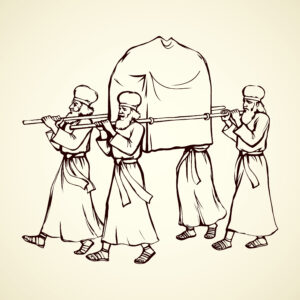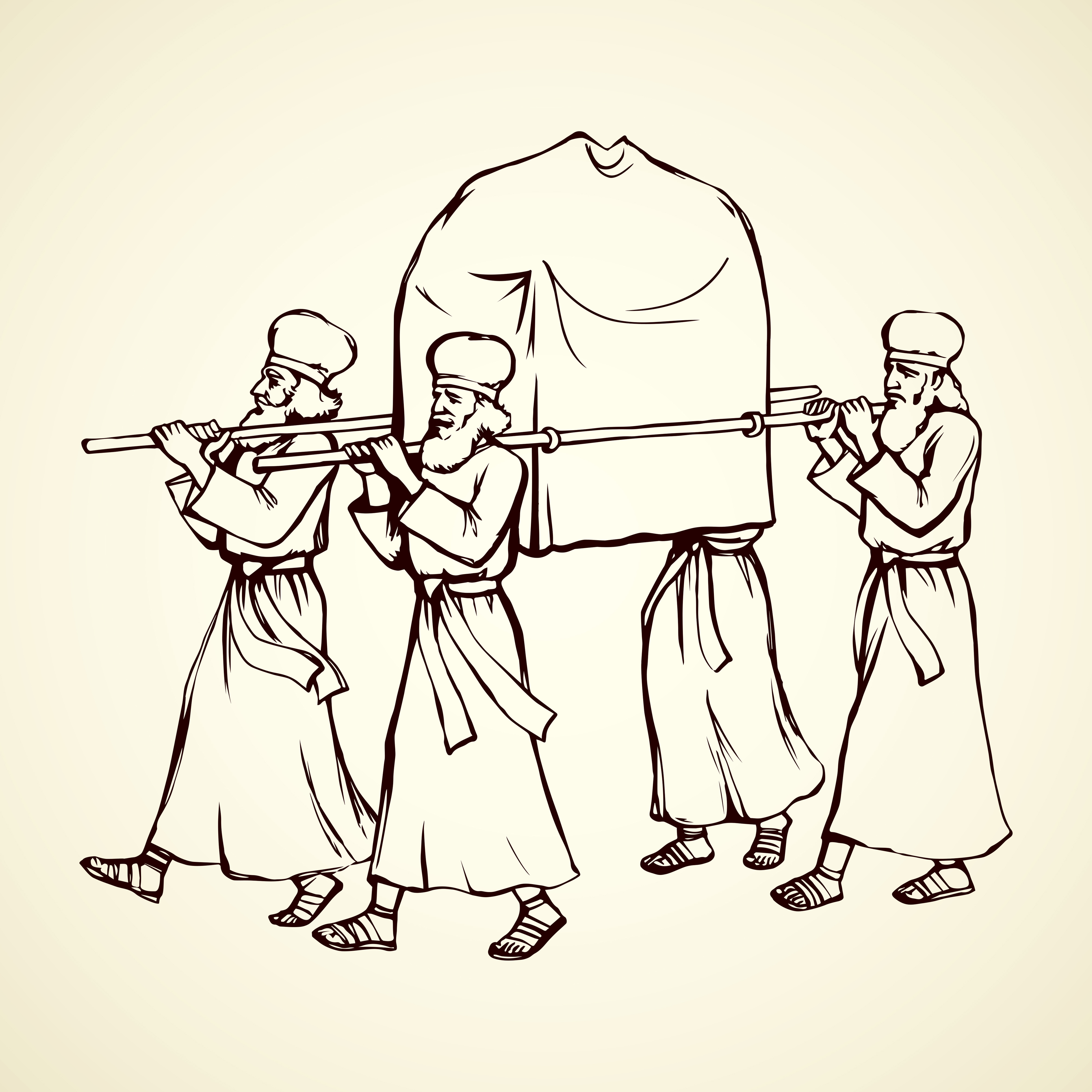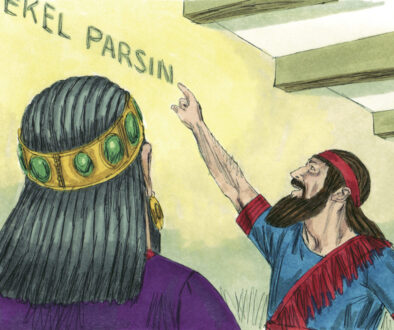Numbers 10 Leaving Sinai

Israel is finally leaving Sinai. They have spent about 11 months at the Mountain of the Lord. They have received MUCH while there, including the Tabernacle and the Law.
It took me a bit of time to figure out who Moses was asking to come with them. It was his brother-in-law. Strange that we didn’t know Moses’ father-in-law even had sons until now. Maybe he was a son-in-law. What has me scratching my head even more was that Moses thought he ‘needed’ Hobab’s help. Sure. Hobab knew the wilderness better than Moses did. But GOD knew it even better. GOD chose where they would settle, where they would walk, and everything in between. They did not need Hobab’s eyes or his knowledge of the area. I’m curious to know how long Hobab had been with the camp.
Sinai was the site of GREAT triumphs and GREAT tragedies. It was the place where the people swore allegiance to the Lord. The place where the Lord gives them all His statutes and Laws. The place where the Spirit of the Lord moved the people in constructing a Tabernacle for the Lord, so He could live among them. But it was also the site where they begged Aaron for ‘other gods’ because Moses was on the mountain ‘too long’. The place where 3,000 were killed because of this grievous sin. God is ready now, to lead them on toward the Promised Land. Let’s join in with the congregation as they begin the next leg of their journey.
♥ ♦ ♥
Moses stands witness as the men who were unable to partake in the Passover feast offer their final sacrifice for the feast of unleavened bread. As soon as the fire died down from consuming the fat, the cloud of the Lord’s presence began to lift from the Tabernacle.
Aaron’s first thought was that they had somehow displeased the Lord. Moses knew different. He had felt something in his spirit all morning. He couldn’t put his finger on it and name it. But as soon as the cloud began its ascent, Moses knew the reason. “It’s time to leave Sinai” Moses announced to those around him.
Aaron quickly retrieved the silver trumpets. Together, Aaron and Eliezar blew the alarm that signaled to the people that they were moving out.
Heads jerked up and the people began looking around. They had no warning about this plan. It had been close to a year since they arrived at Sinai. They were well entrenched in their campsites. They weren’t aa settled as they had been before rearranging the camp, but still, they would need time to pack.
The sound of the trumpets brought a frantic flurry to the camp. When the Levites arrived to begin taking down the Tabernacle, Moses had to calm them down. “You must use care it taking down the Lord’s house. Rushing about will invite disaster.”
This seemed to settle them enough that they could do their work. It took most of the day to pack up everything. As the men from the three clans of the tribe of Levi carefully dismantled the Tabernacle, their wives packed their camps. All would be ready when the time came.
While the packing was going on, Moses had a request to make of his brother-in-law, Hobab. Hobab had come some time ago to visit with Moses. He loved the life in the camp, the sacrifices, the feeling of community. He had been at loose ends since his own wife had died earlier in the year. Being with Moses softened the pain of loss. But he did not truly consider himself part of Moses’ group. They were a great substitute, but also a far cry from the life he had been used to.
“Hobab, ‘We are setting out for the place of which the Lord said, ‘I will give it to you.’ Come with us, and we will do good to you, for the Lord has promised good to Israel.’” (Numbers 10:29)
Hobab shook his head and replied; “I will not go. I will depart to my own land and to my kindred.” (Numbers 10:30)
Moses couldn’t leave it at that. He had seen the pain and emptiness in Hobab’s eyes when he first joined them. He had also seen it’s fading with each passing day. So, Moses pushed a little harder. “Please do not leave us, for you know where we should camp in the wilderness, and you will serve as eyes for us. And if you do go with us, whatever good the Lord will do to us, the same will we do to you.” (Numbers 10:31-32)
Hobab finally agreed to accompany Moses and the people to wherever the Lord led them. Moses knew in his heart that God didn’t need Hobab to help the people find places to camp, but Hobab needed the people. An arrangement that Moses believed God would honor.
In the Tabernacle, the first thing to be done was to take down the inner curtain and wrap it around that Ark and Mercy seat. Aaron and the clan of Kohath did this work. The Ark was then covered by a fine leather covering and finally by a blue cloth. The rest of the inner sanctuary pieces were then covered, their poles inserted, and brought out of the Tent. Packing and storing the rest of the Tabernacle was done by the clans of Gershon, who carried all the fabric pieces of the Tabernacle, and Merari, who carried all the structural components (frames, poles, pegs, and bases).
When all were finally ready, the trumpet sounded again and the tribe of Judah led the way. They followed the cloud, wherever it led. The tribe of Issachar followed on Judah’s heels and the tribe of Zebulun on their heels.
The next to fall into step were the clans of Gershon and Mercia. The clan of Kohath would hold back a little. This gave the two clans carrying the structure of the Tabernacle time to have the Tabernacle set up before the inner furnishings arrived.
As soon as the last of those carrying the Tabernacle structure made it out of camp, the tribe of Reuben took their places in the slow-moving line. Following Reuben were those camped with him on the south side of the Tabernacle; Simeon and Gad.
The clan of Kohath finally left camp carrying all the furnishings of the tabernacle. These were sacred and were carried on the shoulders of the men, using the poles the Lord included in His design.
Next, the tribes of the children of Rachel set out. First was the tribe of Ephraim, then Manasseh, and finally Benjamin.
Those on the north had to wait the longest to leave. Finally, the tribe of Dan led the rear guard for Israel. The tribes of Asher and Naphtali followed along. In their wake was a deserted area. It showed signs of use, but no debris. They cleaned up and cleared out.
It was good to be on the move again, except for the dust that was stirred up by the hundreds of thousands of feet. Scarves were secured over the mouths and noses of everyone. Those herding animals kept them well away from the main procession of people. No one wanted to be constantly stepping in animal dung.
Three days of walking, stopping to rest for meals and sleep greeted the people of Israel. Every time it was time for a break, the cloud pillar stood in place. Each time the Lord said their break had ended, the cloud pillar began moving forward. From the first time the cloud pillar moved, until the last time, Moses would call out; “Arise, O Lord, and let your enemies be scattered, and let those who hate you flee before you.” (Numbers 10:35) And each time the cloud pillar settled, Moses would cry out; “Return, O Lord, to the ten thousand thousands of Israel.” (Numbers 10:36)
There were, of course, those who complained about not knowing where they were going, wishing for more time to rest, or missing the camp they just left. They were in the minority though and their grumbling was kept to a minimum. Moses did his best to ignore them, while praying that their attitude didn’t spread to those around them.
At the end of three days, the people settled down again into their camp formation in the wilderness of Paran. Here they would remain until the Lord told them it was time to move again.
(to be continued)
I cannot imagine the width and depth of that line of people! We know that there were more than 600,000 men over the age of 20. And then there were women and children! Their line must have stretched MILES long! Can you imagine being in the back? The dust? The view from behind? Were they able to see the cloud too? Could they hold onto that as they made their way through the wilderness? And, how long did it take for the command to stop or start take to reach the last people in the procession. I think of vehicles waiting at a traffic signal. Not everyone moves when the light turns green. They each have to wait until the one in front of them moves first. So, how long did it take to actually get the whole camp moving? Can we say that patience was crucial for this task? I would certainly think so!
My final question is, did Moses really want Hobab along for help to Israel or help for Hobab? That’s why I gave him a ‘reason’ to be there in the first place. God needed NO assistance in choosing camp sites for His people. He had the ‘bird’s eye view’ of the whole land. NOT something Hobab could offer.
Father God, thank You for, once again, opening my mind to Your story. Thank You too that I never come away completely satisfied with all the details. You keep me digging, imagining, and thinking. I’m VERY glad I wasn’t part of that procession! You gave them AMAZING strength for their journey. And You waited patiently for the second Passover celebration to end, as well as for those probably millions of people to make their slow progress through the wilderness. “Come along children. It’s just up ahead.”



